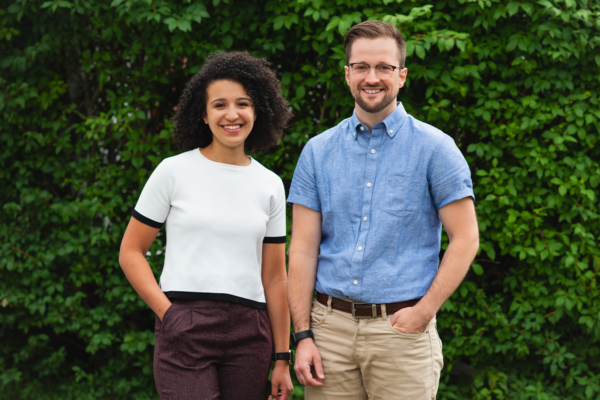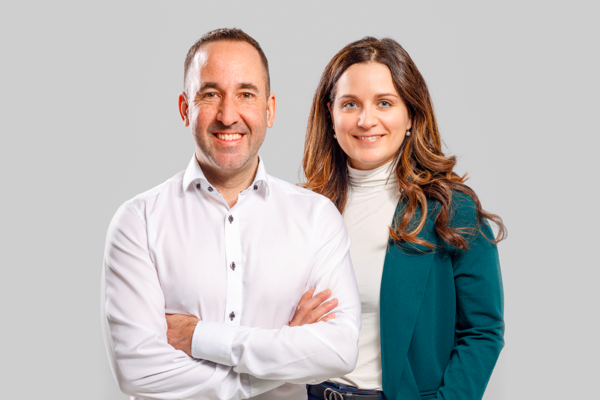Antoine Deschamps-Laporte and Jihane Wahid worked together in a physiotherapy clinic in Montreal before starting their own clinic in Repentigny.
Unable to find a model that made sense to them, the two entrepreneurs chose to create their own model to work with a clientele that is often neglected by traditional clinics.
Their Physio Logis clinic now offers functional rehabilitation to people with neurological conditions: multiple sclerosis, Parkinson’s, stroke, spinal cord injuries, traffic accidents…
These are all people who often find themselves left to their own devices, caught between waiting lists in the public system and unsuitable services in the private system.
Falling through the cracks
When someone is in a traffic accident or suffers a stroke, they are hospitalized for a period and then transferred to the Intensive Functional Rehabilitation Unit. They are then referred to an external clinic to continue their rehabilitation.
The only problem is that waiting times for an external clinic are long. Very long. For a sub-acute condition (low intensity symptoms that are lingering and only slightly easing), the wait can be 2 to 3 months or exceed 6 to 18 months for a chronic condition in most regions of Quebec.
Given this interminable wait for the public system, the private sector is often offered as an alternative.
But, unlike Physio Logis, most private physiotherapy clinics are only for the “general” public with musculoskeletal disorders. Their personnel do not specialize in neurological problems, and their equipment is not suited to the needs of this clientele.
This is not to mention the high cost of traditional private clinics, at a time when these people are experiencing challenges with their employment because of their neurological conditions.
Beyond the impatience created by this waiting period, the absence of follow-up also has a major impact on their health. The longer the waiting time, the harder it is for the person to recover their mobility and motor skills.
“Everyone in the community knows that it’s easier and less expensive to prevent deconditioning than to reverse it after a year or two,” says Antoine. “Early intervention can make all the difference.”
Even if someone ends up getting a spot in an external clinic, patients sometimes want to go beyond the objectives set in rehabilitation. Physio Logis makes it possible to complete what was started in an external clinic – in addition to serving people who are waiting.
Many neurological disorders require long-term care. This is the case for chronic or degenerative illnesses, such as multiple sclerosis.
“People with neurological conditions, particularly those that are chronic, fall between the cracks,” Antoine says. “People who normally have access to rehabilitation in the public system are those with an acute condition, who have been hospitalized or who have had surgery. For someone suffering from multiple sclerosis or Parkinson’s for 10 years, or who had a stroke three years ago, public services simply don’t exist.”
To meet the needs of people who are living with neurological conditions, Antoine and Jihane have developed a clinical model that is also between the cracks. Between the private and the public systems.
“While our clinic is private, we believe that there is a sort of hybrid model that could emerge by borrowing certain characteristics from the private and public systems,” Antoine says. “If we combine the adaptive, creative, and proactive side of the private system with the network of professionals and resources in the public system, we are able to deliver better services to a clientele that is currently orphaned.”
It all starts from the need
Accessibility is at the heart of what Physio Logis does.
Space adapted for people with reduced mobility, an accessible bathroom, a suspension system, parallel bars, an elevator… Jihane and Antoine have thought of everything.
“Our greatest pride is having created what we imagined,” Jihane explains. “A clinic that responds to the needs of people with neurological disorders.”
Obviously, that meant higher costs. But for Jihane and Antoine, this investment was essential to best meet the needs of people who are living with neurological conditions. “Given our clientele, we are very different from other clinics,” says Jihane. “We have no choice but to be different.”
The price of physiotherapy sessions is also adapted to the clientele’s means. And Jihane and Antoine plan to offer pro bono care in the future. These two entrepreneurs have also established a partnership with the CIUSSS de Lanaudière that covers the fees for certain patients who have been on the waiting list for a long time.
Physio Logis is unique for the flexible time allocated to appointments, varying based on the patients’ needs. Jihane and Antoine want to take the time they need with their patients rather than adopting an approach that is too rigid.
High costs for equipment, rates adjusted to the financial needs of their clientele, more time allocated to patients… While these choices are justified clinically, they also represent a challenge for the profitability of their business.
Between physiotherapy and entrepreneurship
Before being entrepreneurs, Jihane and Antoine identify first and foremost as physiotherapists.
“We are excellent physiotherapists, but in terms of management, we needed training (…),” Jihane says. “Do we think like entrepreneurs or physiotherapists? It can tear you in two. We need to think of the patients. But we also have to think about the survival of our clinic if we want to continue to offer our services.”
How do we reconcile our social values with our business’s profitability? It’s a question impact entrepreneurs regularly ask.
Jihane recommends getting outside advice and adapting it to your reality as an impact business. But she admits that it is not always easy to find the middle road.
For each decision, Antoine and Jihane put themselves in their clientele’s shoes, asking, “What impact would this have on me if I were a patient?”
This is why, when it comes to decisions, the impact on the clientele tends to weigh more in the balance than the business’s growth.
“We could make more money. [But] when we see the impact of what we do, it reminds us that it’s worth it.”
• • • • • • • • • • •
Thanks to the engagement of invaluable partners: Économie Québec, through its agent Investissement Québec, National Bank, the Business Development Bank of Canada (BDC), the Fonds de solidarité FTQ, and Fondaction, Evol has a large envelope to support, through conventional loans, businesses with inclusive, diversified ownership that generate positive social and environmental impacts in line with the UN’s sustainable development goals (SDG).






